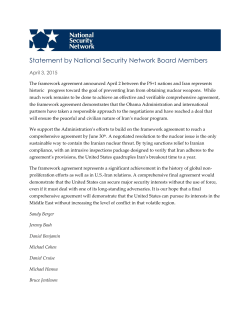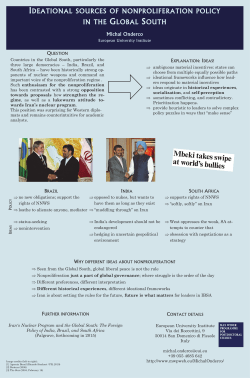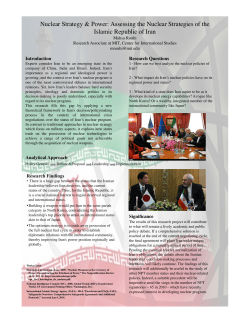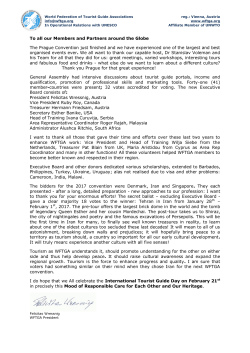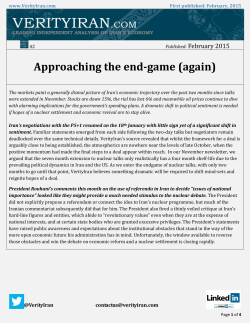
Good Deal or No Deal? Recommendation for Independent Review
National Security Program Foreign Policy Project ISSUE BRIEF: Good Deal or No Deal? Recommendation for Independent Review of Iran Nuclear Agreement MARCH 2015 It has become an oft-repeated mantra by Republicans and Democrats, Members of Congress and Obama administration officials alike that when it comes to negotiations over Iran’s nuclear program, “no deal is better than a bad deal.” While true, this pronouncement glosses over several crucial and problematic truths that will make it difficult for the public to judge a deal for themselves – and whether any announced deal is or is not “a good deal.” First, there is no agreed upon standard of what constitutes a good deal. One of the major sources of contention between Capitol Hill and the White House has been markedly different interpretations of what conditions are necessary to prevent a nuclear Iran. And, as a Bipartisan Policy Center analysis detailed, while there is basic agreement about what issues a deal would have to address, there has been no explicit government statements on what would be considered “good” terms on each of those issues. The closest thing there is to a standard, albeit a much-disputed one, is Secretary of State John Kerry’s statements that a deal should put Iran at least one year from attaining a nuclear weapon. Worse still, even if there were such a standard, very few people, if presented with the deal, would be capable of determining whether it lives up to that standard. Any agreement will combine multiple highly technical details—from centrifuge numbers and type, to stockpile enrichment level and amount, to research and design limitations, reactor redesigns, international monitoring regimes—that will be difficult for anyone that is not a nonproliferation expert to make sense of, let alone understand how they impact Iran’s ability to pursue nuclear weapons. And, finally, similar to how technical details of the current interim agreement, known as the Joint Plan of Action (JPA), were never made public, it is possible that a final deal with Iran will never be released for general scrutiny. While the framework of the JPA was released to the public, the specifics of its implementation were not. Members of Congress wanting access to this information had to view a hard copy of the agreement in a secure room in the Capitol. If the full content of a comprehensive agreement will be similarly hard to obtain, judging its merits will prove complicated even for those with the technical knowhow to do it. It is not enough, therefore, to negotiate a deal with Iran. Given the major national security stakes, it is imperative that U.S. leaders devise a way to allow the American public to understand, consider and evaluate for themselves whether the agreement clears the bar for a “good deal.” The 2003 invasion of Iraq highlights the damage done to trust and cooperation in our nation when momentous decisions of war and peace are made without sufficient public scrutiny and debate. A nuclear deal with Iran, which promises to resolve the most pressing national security challenge of our time, should only be entered into after being subjected to such scrutiny. Additional details on how an independent review panel could work: Using the model of Quadrennial Defense Review Independent Panel, created by 2010 National Defense Authorization Act (NDAA), or the more recent National Commission on the Future of the Army, created by the 2015 NDAA, the panel would be Congressionally-mandated, with members selected by both the president and the chairs and ranking members of the relevant congressional committees, in this case Senate Committee on Foreign Relations and House Committee on Foreign Affairs. The review panel should be created and filled now, so it is ready to begin work once a comprehensive agreement is reached by the June 30, 2015 deadline established by the administration. Given that the panel would not have the power to reject the deal—only to evaluate it—the creation of such a panel should not impact negotiations in anyway. The review panel should be given clearances and access to all details of a comprehensive agreement, even those that might otherwise be classified, in order to fully inform its assessment. While the focus of its report should be arriving at a public assessment of how the deal would impact Iran’s ability to pursue nuclear weapons, any part of its report that deals with these details could be in the form of a classified annex. Both the White House and Congress should agree that during the duration of the panel’s work (60 days, for example) as well as an additional public review period (15 days, perhaps), neither branch would take any action on the agreement whatsoever. This would mean that during this time the executive would withhold from implementing any form of sanctions relief or taking any action at the United Nations while Congress would neither take any votes on the deal nor take up additional sanctions legislation. Issue Brief: Good Deal or No Deal? Recommendation for Independent Review of Iran Nuclear Agreement | 2 The review panel’s report should not be an endorsement or rejection of the deal itself, but rather a consensus evaluation of its implications for Iran’s nuclear abilities. Potential topics it should address are: estimates of Iran’s enriched uranium breakout timing under the deal; evaluation of plans to address possible plutonium breakout at Arak heavy water reactor; implications of any restriction on centrifuge research and design for Iran to advance its nuclear program; assessment of safeguards measures included in the deal; analysis of any information Iran is required to reveal about the possible military dimension of its nuclear project; assessment of any limits on Iran’s ballistic missile program. If no consensus is possible among the group, majority and dissenting opinions should be published. The idea of assessing Iran’s nuclear program or a potential nuclear deal is not a novel one on Capitol Hill. In 2013, the House passed, by a vote of 400 – 20, the Nuclear Iran Prevention Act, which contained a provision (Section 402) requiring the president to regularly report to Congress his assessment of how close Iran was getting to a nuclear weapons capability. Similarly, the Iran Nuclear Agreement Review Act, introduced by Senators Corker (R-TN) and Menendez (D-NJ) in February 2015, requires (Section 135.2) the Secretary of State to submit a “verification assessment report” that evaluates the adequacy of the safeguards imposed by a comprehensive agreement. When it comes to the comprehensive agreement, however, there is little doubt that the White House will deem the deal it negotiated adequate. This is precisely why this sort of reporting will not resolve the lack of a credible and objective resources to help Congress and the American public judge a deal. Instead, or in addition to such executive reporting, we believe an independent panel of experts is needed to review, assess and evaluate a deal’s impact and effectiveness. Creating such an independent panel to review and assess a potential comprehensive agreement with Iran will help to ensure that there is both credible and objective information contributing to a public debate about whether the deal is, in fact, a “good” one. As a secondary benefit, it would also help rebuild some of the trust and goodwill that has been lost between the Congress and White House. It would signal to the administration that congressional skeptics are willing to consider a deal on its merits and reassure Members of Congress that the president is committed to the idea that “no deal is better than a bad deal.” Together, public consideration of a deal and greater cooperation between the executive and legislative branches are the best recipe for making sure we do not end up with a bad deal. Issue Brief: Good Deal or No Deal? Recommendation for Independent Review of Iran Nuclear Agreement | 3
© Copyright 2025
